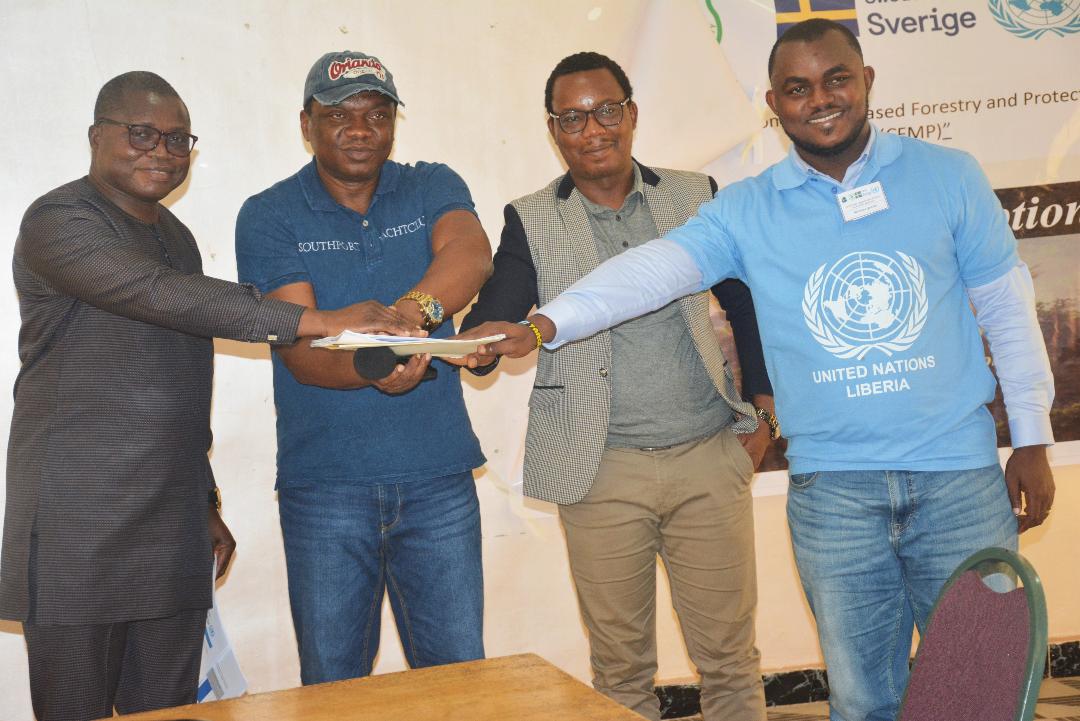Monrovia, Liberia- The Swedish-funded Community Forest and Protected Area Management project has kicked off its activities in Gbarnga, Bong County after an inception workshop, a UNDP press release said on Monday, November 39, 2022.
Before the start of the activities, the Forestry Development Authority together with the UN Development Programme (UNDP) and the UN Food and Agriculture Organization (FAO) on 25 November held the inception workshop.
The project will improve the governance of community forest management bodies and build capacity of forest regulatory institutions by strengthening the policy and legislative environment for community forest management. The goal is to establish protected forest areas that are entirely managed by communities, as well as to create space for communities to contribute to national discussions and decision-making processes in the forestry sector.
Reaffirming commitment to community forestry management, the Managing Director of the Forestry Development Authority (FDA), Hon C. Mike Doryen called for learning from past community conservation initiatives and “thinking outside the box” to explore new ways of ensuring communities see real benefits to conservation efforts.
While Liberia’s forests cover about 69% of the country’s land mass, they are under threat from extensive logging and chainsaw milling, commercial tree crop plantations, slash and burn agriculture, and unsustainable harvest of non-timber forest products, especially in rural areas, where there are few economic and jobs opportunities.
“The aim of this project is to ensure that communities can manage and derive economic benefits through sustainable alternative livelihood options such as non-timber forest enterprises, climate-smart farming, and agroforestry. This, we believe, will improve the living conditions of the people, and provide economic incentives for community-driven forest
conservation in Liberia,” said Louis Kuukpen, UNDP Liberia’s Deputy Resident Representative.
The project will promote resilient, low-carbon land management through diversification of non-timber forest product smallholder value chains by developing sustainable forest and farm production. It is envisioned that this will increase forest communities’ resilience to environmental shocks and stresses, and increase the productive engagement of youth, women, and persons with disabilities in sustainable utilization of local forest resources.
A representative from the Swedish Embassy Jenkins Flahwor emphasized the importance of mainstreaming gender and women-related issues as well as anticorruption measures for the success and sustainability of the project.
The project will take lessons from previous efforts to strengthen community forest management to enhance the conservation of forest biodiversity, and leverage forest carbon stocks to finance development and promotion of sustainable livelihoods. It will also promote inclusivity and social equity by supporting women-led initiatives and enhance women participation in decision-making in land use and governance activities.
Outlining the long history of supporting the Government manage forests, the FAO committed to continue to support sustainable forest management in Liberia.
It will also empower local CSOs and NGOs, alongside forest and farm producer cooperatives to integrate natural resources management and promotion of sustainable livelihood incentives for communities living on the fringes of forests. This will be done through creation and strengthening of resilient land management initiatives, and promotion of equitable, and development of smallholder value chains for non-timber forest products.
“It is important to strike a balance between economic growth, social progress, and environmental sustainability. This means we should seek to conserve our biodiversity and protect the environment without compromising the livelihoods of the people who depend on forests,” added Louis Kuukpen.

